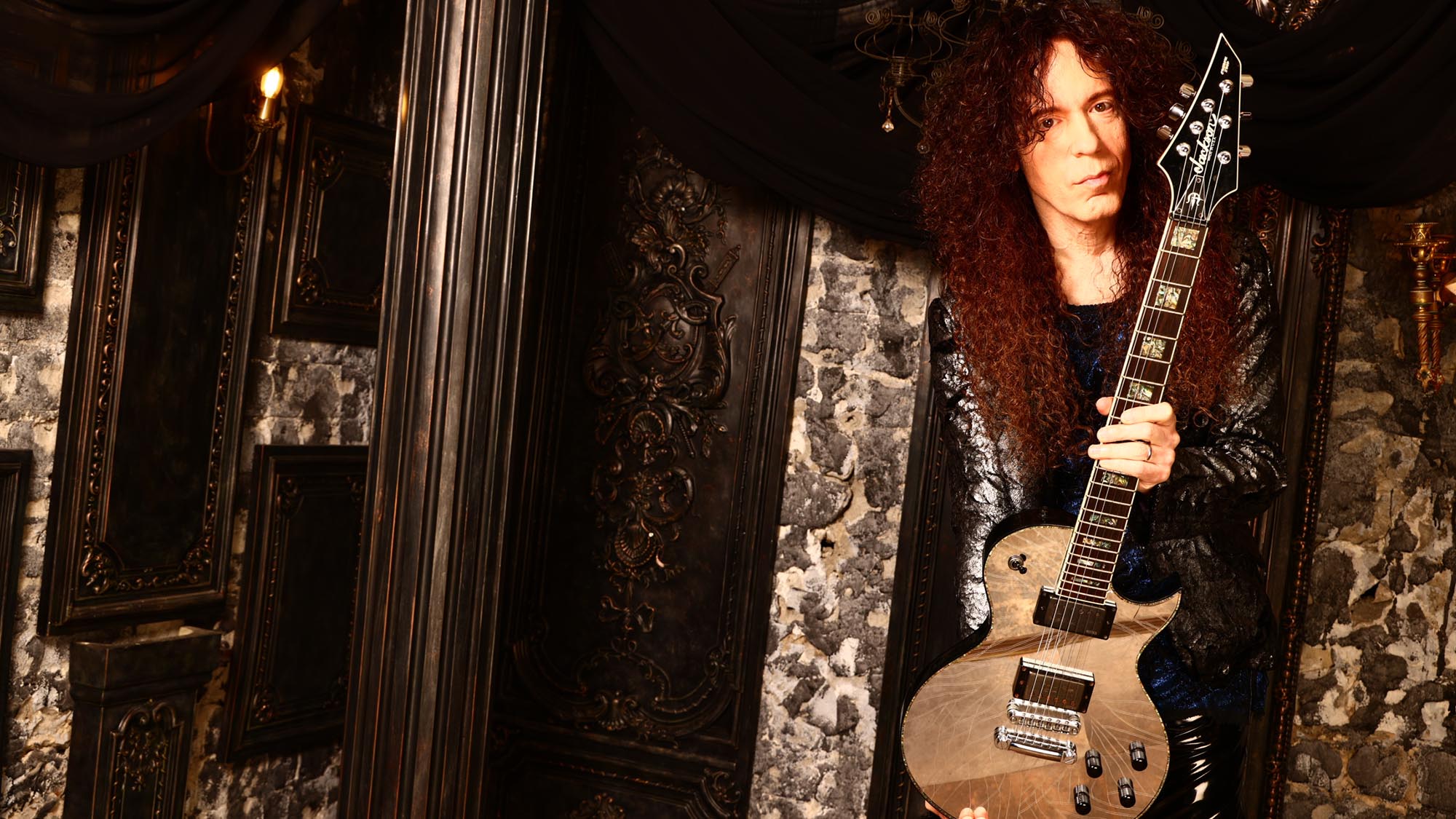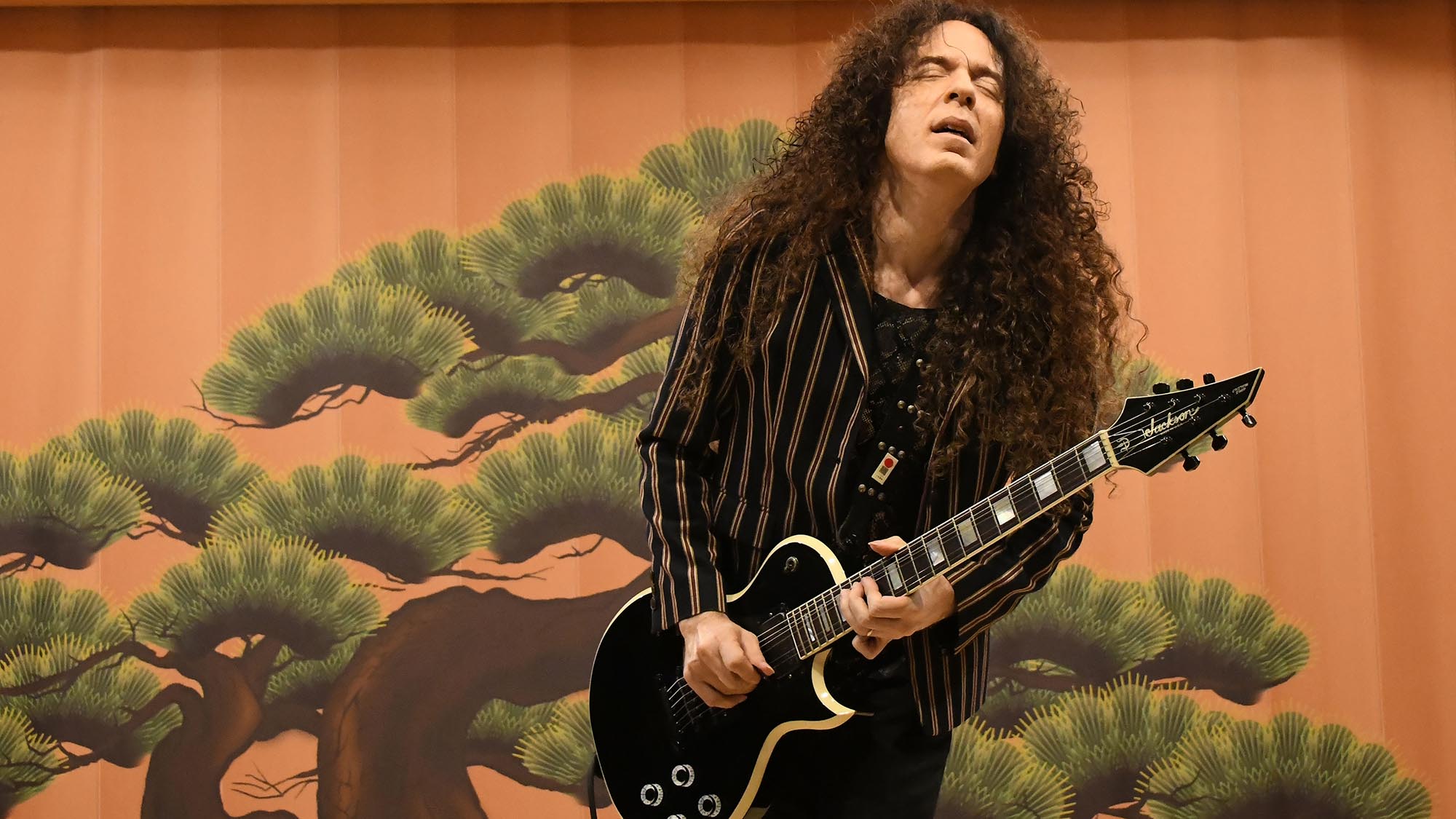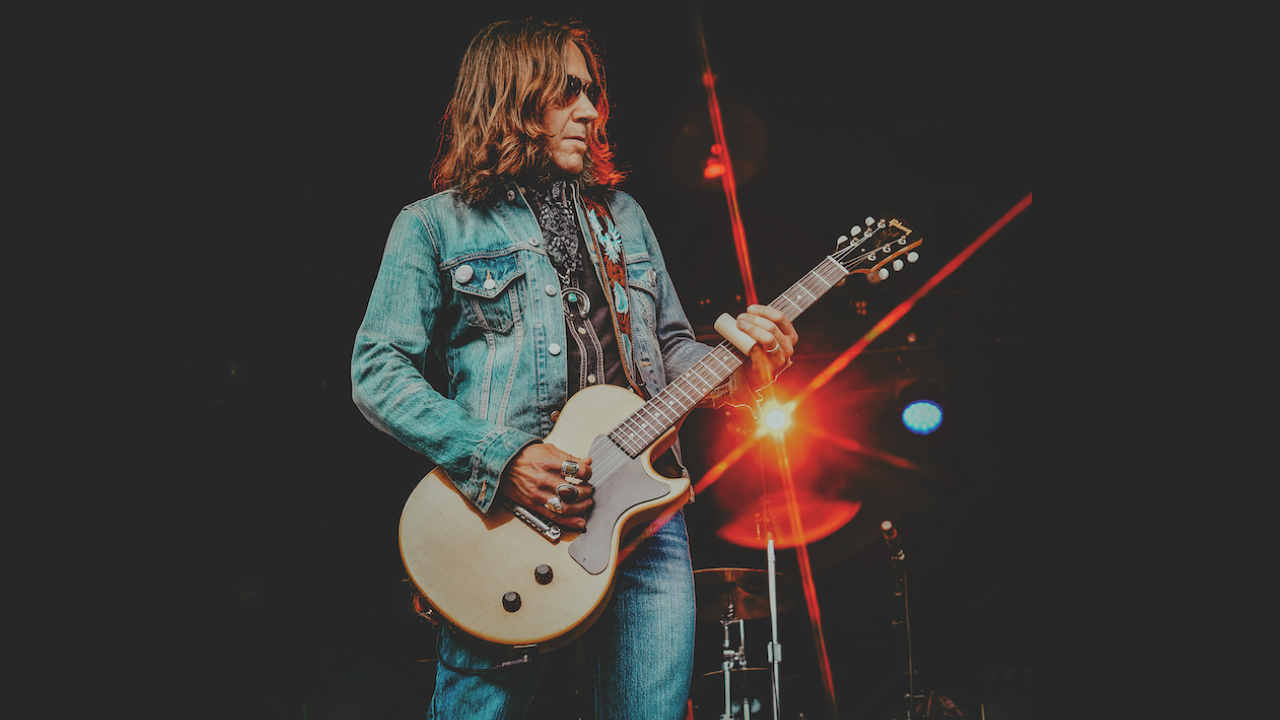“I don’t have any vintage gear. I’ve always been a ‘new gear’ type of guy. But on this album, I’m seeing the light a little bit”: Marty Friedman on Drama, and how his “love letter” to his audience takes his playing – and gear – into unchartered territory
Friedman promises a full-fat high-calorie version of his artistic self on a new record that might have some virtuoso licks but will challenge the idea that he is a shredder

“I’ve pushed a lot of boundaries on this [album] and surpassed any of the guitar playing I’ve done before,” Marty Friedman tells Guitar World about Drama, his new record. “If you want to talk on a guitar level, it’s – without question – the deepest dive into my playing that I’ve ever done.”
That’s some next-level thinking from the former Megadeth and Cacophony guitarist who’s been putting out solo albums since the late ’80s. And although those words shouldn’t exactly surprise you if you’ve followed along with Friedman’s career, it still takes balls to say it. But listening to Drama, one can’t help but think Friedman might be onto something.
“The amount of energy, effort, love and ‘putting myself out there’ that goes into a record like Drama – it’s like night and day compared to other projects that people might have found me from,” he says. “It’s the absolute purest, highest-percentage, highest-calorie version of what I am as an artist.”
Drama seems like a particularly important record for you. What brought you here?
“I’m very interested in finding out why you thought this was an important record for me – because it is, in fact, a very important record for me. What was it about the record that made you say that? I’m curious.”
Despite being an instrumental guitar player, you’re keying in on certain emotions and trying to tell a story via textures. The placement of your solos – it just seems different.
“Well, I’d like to think I’m getting better at what I do. If I listen back to my previous work, which I rarely do, I know there’s a lot of things I still would smile about, but there’s [also] a lot of things I wouldn’t do that way anymore because I’ve evolved from that. I think Drama is the sum of so many varied life experiences – [and] the sum of all those things put into music.
All the latest guitar news, interviews, lessons, reviews, deals and more, direct to your inbox!
“I’m totally aware that a lot of people, especially in America, know me from my previous bands and my early solo records, and they think, ‘Well, he went to Japan, and that was that.’ You know, ‘He’s doing something in Japan.’ I don’t fault them for knowing just that much, but I think on this record, it’s undeniable that I’m reaching out to people around the world, not just the Japanese audience.”
It’s a snapshot of where you are, right here, right now.
“Artistically, this is exactly where I’m at. You might know me from something in the past, [or] you might not. This is brand-new for a lot of people to listen to. So it’s very important to introduce myself to people with this. As I was making this record, I paid extreme attention to not repeating anything I had ever done conceptually while touching on and embellishing what I found to have been the best parts of my music in the past.
This is a love letter to those people who have followed me, even though I haven’t always been in America, and to those people who’ve kept me in their musical rotation
“Some people have liked my music in the past, and I try to guess what they liked about it. If that matches what I like about my music, I tried to embellish that. To sum this up, this is a love letter to those people who have followed me, even though I haven’t always been in America, and to those people who’ve kept me in their musical rotation.
“But it’s also an introductory letter to the people who may have forgotten about why they liked my music in the first place – and for the people who have no idea who on Earth I even am! With those criteria in mind, I chose the music very carefully. It was with that purpose.”
Another perception that most people have is, “Marty Friedman is a shredder”, and they go into your albums with that in mind. But there are a lot of surprises here in terms of how you placed your solos while still making them grandiose – and still quintessentially you.
“I like your words better than mine. I think what’s important to me is that grandioseness comes from something, and what that comes from is the placement of phrases, so to speak. A lot of people learn these very intricate, difficult things, and they just play them.
“On the surface, it’s no big deal, but if you put them in the most delicious spot and build up a piece of music, that’s the Holy Grail of things I’ve been trying to develop over my career. You have to create this groundwork of a piece of music that allows you these delicious spots in the song, and in those places, you put the phrases that are going to give people goosebumps, make a tear come out of their eye and give people chills.
“This is the thing I’ve been developing over the years, and when I listened back to my older stuff, it’s very primitive. I had fancy phrases and stuff, and I put them out there; but over the years, I found ways to build up the foundation of the piece of music so that the listener gets excited when they hear these things.”
One track that immediately did that for me was Illumination. There was a feeling there, though, that it was difficult to track. It was as if a story were unfolding.
“Well, thank you very much for your words. I hope that you leave all your comments in! It’s important, especially on this album, because it was constructed to bring out emotions. I think a lot of bringing out emotions comes from subliminally and consciously taking familiar melodies from people’s childhoods, like little bits of familiar melodies.
Some of the heart of the content, the chord work and the way notes fall over the chords, is kind of timeless. They’re the melodies that could be in the Top 10 now, or they could have been in songs Doris Day sang in the '50s
“All of us have been listening to music for many years, but there are familiar turns of cliché melodies that we’ve grown up with and maybe haven’t heard for decades. And there might be a little three seconds of a melody. The last time you heard this melody was when you were five years old, walking somewhere with your mom. As someone who is constantly surrounded by, listening to, analyzing and enjoying music, my will is deep enough to drag things out.
“If you listen to my record, it sounds modern; it sounds like it was recorded in 2024. Some of the heart of the content, the chord work and the way notes fall over the chords, is kind of timeless. They’re the melodies that could be in the Top 10 now, or they could have been in songs Doris Day sang in the ’50s. These melodies are only mine because I interpret them my own way. But they must have come from somewhere in my life and in everyone’s life. This album is the best example of doing that [that] I’ve ever had.”
Instrumental music is fascinating, especially when the main voice is a guitar. But as far as themes, are they implied, or did you have something in mind?
“I hope the melodies stick with people for their own reasons. When I’m creating an album like this, I’m creating many demos before I even consider going in to make the real record. And for whatever reason, certain melodies stick with me. I want those melodies to represent me. When people hear my name, that melody might pop into their minds, and I have to make that choice. It’s kind of a big responsibility, so there’s something in these melodies that resonates with me.
“By the same token, when people are listening to music that they like, there’s some indescribable thing they hear that makes them enjoy it and want to hear it again. They want to buy it; they want to be surrounded by this sound; it’s their music, you know? All of the music that’s in your collection – that’s your music. It’s very personal, so there’s not some kind of formula; there are probably pop artists following some algorithm and doing something in that world, but in my world, there’s just absolutely no formula.”
I’d be remiss if I didn’t touch on the solos. What is the function of solos within the context of your music?
“Of all the things that I’m able to do, solos are probably the sharpest weapon in the toolbox. That’s kind of the easiest thing for me to do. My main goal is to create musical landscapes so I can come in as a soloist and send this piece of music home.
My whole purpose in creating my own music is to create music as a whole. I don’t want people to walk away and say, 'Wow, he’s a great solo player'
“That’s the biggest challenge; creating a delicious point to play a solo is an endless pursuit. But when you get it, the solos feel so incredibly good and so natural, and you feel like, ‘This is exactly what I’m here to do.’
“There are a lot of guitar solos on this record. Go figure – it’s a Marty Friedman record, and there are going to be a lot of solos! The solos are going to be deeper, richer and more advanced, for lack of a better word, than any of the solos I’ve ever done before.
“But my whole purpose in creating my own music is to create music as a whole. I don’t want people to walk away and say, 'Wow, he’s a great solo player' or 'Those are some fancy guitar licks.' I just want people to feel these emotions from hearing the music.”
Looking at a song like Icicles, that checks out. I walked away from it thinking less about the impressive technical aspect and more about the vibe.
“I’m very happy to hear that. Because I’m as guilty as anyone else; there was a lot of showboating on some of my earlier records that a lot of people know me from. I had a lot of that to say, and I really believed in that at the time. But looking back on that, it’s kind of funny, and despite that, I think there are some moments on those early records where I hit a couple of good emotional points.
“But as you grow as a player, musician and artist, you try to appeal to a more honorable part of the listener’s personality. Trying to appeal to someone’s impression of you as a technically gifted player, that’s kind of low-hanging fruit. It really is. Because all you really need to do is practice, and you’re going to impress a lot of people with your playing.
“Of course, it’s a wonderful thing; believe me, I’ve done a lot of that in my early years. And I really hope that people are impressed with my playing now as well. When you make it to your 17th record, you realize that people knew that you could play a long time ago. And anyone can play; there’s millions of fantastic, great players. So, what separates me, or any other person, from the others is the artistic world that they create and the feelings that the listener gets when they listen to it.”

One of the things I notice about Drama is how textural it is. What sort of gear did you deploy to make that happen?
“A lot of this stuff came from old gear. The Fender Twin I used was from the ’60s or something like that. And I don’t have any vintage gear – I don’t own any of it. I’ve always been a ‘new gear’ type of guy. I’ve never understood vintage gear; I’ve never had the capacity of knowledge for it, the patience for it or the love of it, for that matter. But on this album, I’m seeing the light a little bit.
I can’t imagine an amp that still exists from the ’60s… I mean, how much beer and bong water must be in that thing?
“In the hands of someone who knows how to maintain vintage instruments, I can’t imagine an amp that still exists from the ’60s… I mean, how much beer and bong water must be in that thing? I can’t even fathom it.
“I use new gear on every single tour, and I love it. But in the hands of a master technician who can maintain vintage gear, it really gives a complete, new and beautiful light to shine against the modern gear that I’m also playing all over the record.”
What do you hope people take away from this record?
“I’m very excited about new people hearing my music because it’s been very encouraging over the last years touring outside of Japan. I’ve been noticing that the demographic of fans coming to my shows and the demographic of people hearing my recent music has been so much younger. I think younger people are going to hear this music with a very fresh and clear palate.
“I’m excited to hear people who maybe don’t know me and say, ‘Well, I heard this guy Marty plays a mean guitar, but I had no idea that this was in him.’ A lot of people might have left off on my career where they might have been thinking, ‘Well, he’s this super guitar player…’ But I think a lot of people are gonna say, ‘I didn’t know he had it in him. I didn’t know he had this in him.’”
I’ve been fortunate to have such a long career where I’ve done so many things and so many varied things; it might be easier to categorize me if I was like, you know, the Ramones, where you know exactly what you’re getting
What misconceptions about you would you like to put to bed once and for all?
“People discover you when they discover you, and then they discover you for whatever reason they discover you for. There are no real misconceptions, you know what I mean? There really isn’t. I’ve been fortunate to have such a long career where I’ve done so many things and so many varied things; I mean, it might be easier to categorize me if I was like, you know, the Ramones, where you know exactly what you’re getting.
“For better or for worse, I’ve done a lot of things, and I’ve signed off on everything I’ve done; I’m not ashamed of anything. Wherever you found me in my career, that’s great. So there’s not any kind of misconception that I’d like to put to rest.
“If you’ve found anything that speaks to you in my creative output, that’s wonderful. You can’t appeal to everybody all the time. But I will say this: this album, Drama, is a very good representation of the deepest core of what I am as an artist.”
- Drama is out now via Frontiers.
Andrew Daly is an iced-coffee-addicted, oddball Telecaster-playing, alfredo pasta-loving journalist from Long Island, NY, who, in addition to being a contributing writer for Guitar World, scribes for Bass Player, Guitar Player, Guitarist, and MusicRadar. Andrew has interviewed favorites like Ace Frehley, Johnny Marr, Vito Bratta, Bruce Kulick, Joe Perry, Brad Whitford, Tom Morello, Rich Robinson, and Paul Stanley, while his all-time favorite (rhythm player), Keith Richards, continues to elude him.








